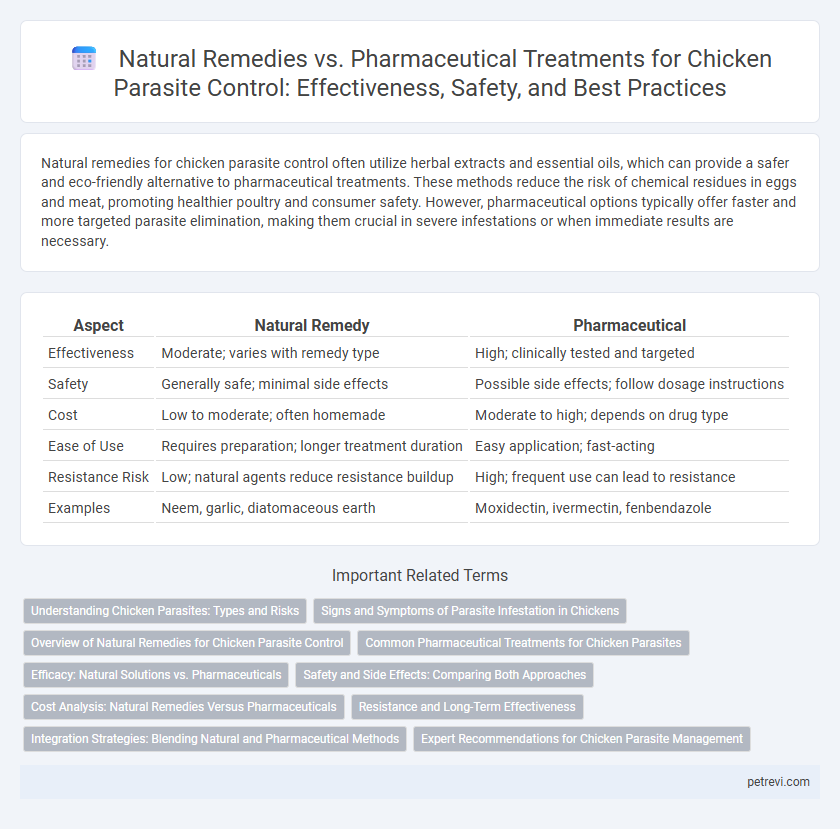Natural remedies for chicken parasite control often utilize herbal extracts and essential oils, which can provide a safer and eco-friendly alternative to pharmaceutical treatments. These methods reduce the risk of chemical residues in eggs and meat, promoting healthier poultry and consumer safety. However, pharmaceutical options typically offer faster and more targeted parasite elimination, making them crucial in severe infestations or when immediate results are necessary.
Table of Comparison
| Aspect | Natural Remedy | Pharmaceutical |
|---|---|---|
| Effectiveness | Moderate; varies with remedy type | High; clinically tested and targeted |
| Safety | Generally safe; minimal side effects | Possible side effects; follow dosage instructions |
| Cost | Low to moderate; often homemade | Moderate to high; depends on drug type |
| Ease of Use | Requires preparation; longer treatment duration | Easy application; fast-acting |
| Resistance Risk | Low; natural agents reduce resistance buildup | High; frequent use can lead to resistance |
| Examples | Neem, garlic, diatomaceous earth | Moxidectin, ivermectin, fenbendazole |
Understanding Chicken Parasites: Types and Risks
Chicken parasites include external types such as lice and mites, and internal types like roundworms and coccidia, each posing distinct health risks that impair growth and egg production. Natural remedies such as diatomaceous earth and herbal treatments offer a chemical-free approach to parasite control but may require more frequent application and careful management. Pharmaceutical treatments provide targeted, potent parasite elimination with proven efficacy, though resistance and residue concerns necessitate responsible use.
Signs and Symptoms of Parasite Infestation in Chickens
Parasite infestation in chickens typically presents with signs such as weight loss, decreased egg production, lethargy, and visible mites or lice on feathers. Natural remedies like diatomaceous earth and herbal treatments are often preferred for controlling external parasites without chemical residues. Pharmaceutical options, including antiparasitic medications like ivermectin or fenbendazole, effectively target internal parasites but require precise dosing to avoid resistance and toxicity.
Overview of Natural Remedies for Chicken Parasite Control
Natural remedies for chicken parasite control include diatomaceous earth, garlic, and neem leaves, which possess antiparasitic properties that help reduce external and internal parasites organically. These methods promote flock health by minimizing chemical residues and resistance associated with pharmaceutical treatments. Incorporating natural remedies into poultry management offers an eco-friendly alternative that supports sustainable chicken farming practices.
Common Pharmaceutical Treatments for Chicken Parasites
Common pharmaceutical treatments for chicken parasites include antiparasitic medications such as ivermectin, fenbendazole, and praziquantel, which target internal parasites like worms and external infestations such as mites and lice. These drugs offer precise dosages and rapid efficacy, reducing parasite loads significantly and improving overall flock health. Regular administration following veterinary guidance is crucial to prevent resistance and ensure optimal parasite control.
Efficacy: Natural Solutions vs. Pharmaceuticals
Natural remedies for chicken parasite control, such as diatomaceous earth and herbal extracts like garlic and neem, offer mild to moderate efficacy by disrupting parasite life cycles and enhancing immunity. Pharmaceutical treatments, including ivermectin and fenbendazole, provide high efficacy through targeted elimination of parasites like coccidia, lice, and worms but may carry risks of resistance and residues. Balancing natural and pharmaceutical approaches can optimize parasite management while minimizing adverse effects on flock health and product safety.
Safety and Side Effects: Comparing Both Approaches
Natural remedies for chicken parasite control often use herbal ingredients like diatomaceous earth and garlic, which generally present minimal side effects and pose lower risks of toxicity to birds. Pharmaceutical treatments, such as anthelmintics like fenbendazole and ivermectin, offer targeted parasite elimination but may carry risks of drug resistance, residues in eggs or meat, and potential toxicity if improperly administered. Balancing efficacy and safety requires careful consideration of withdrawal periods, dosage accuracy, and monitoring to minimize adverse effects on chicken health and food safety.
Cost Analysis: Natural Remedies Versus Pharmaceuticals
Natural remedies for chicken parasite control often present a lower upfront cost due to readily available ingredients like diatomaceous earth or apple cider vinegar, making them an affordable option for small-scale or backyard poultry keepers. Pharmaceuticals, although more expensive initially, provide targeted and fast-acting treatment through products such as ivermectin or fenbendazole, potentially reducing overall expenses by minimizing production losses caused by parasite infestations. Cost analysis reveals that natural solutions may require repeated applications, increasing labor and time investment, whereas pharmaceutical interventions can deliver long-term efficacy with fewer treatments, impacting the total cost-effectiveness for poultry farmers.
Resistance and Long-Term Effectiveness
Natural remedies for chicken parasite control often reduce the risk of resistance development due to their complex mixtures of bioactive compounds, promoting sustainable long-term effectiveness. Pharmaceutical treatments, such as anticoccidials and anthelmintics, can induce drug resistance in parasites, diminishing their efficacy over time and necessitating higher doses or alternative drugs. Integrating natural approaches with strategic pharmaceutical use enhances parasite management by balancing immediate control with long-term resistance mitigation.
Integration Strategies: Blending Natural and Pharmaceutical Methods
Effective parasite control in chickens requires integrating natural remedies like diatomaceous earth and herbal extracts with pharmaceutical treatments such as ivermectin and fenbendazole to enhance efficacy and reduce drug resistance. Combining these methods supports a more sustainable approach, leveraging natural antiparasitic properties alongside targeted pharmaceutical intervention to maintain flock health. Regular monitoring and tailored treatment schedules optimize parasite management, ensuring balanced use of both strategies.
Expert Recommendations for Chicken Parasite Management
Experts emphasize integrated parasite management combining natural remedies like diatomaceous earth and herbal treatments with targeted pharmaceutical interventions such as ivermectin or fenbendazole. Regular monitoring of parasite loads and rotation of pharmaceutical products help prevent resistance and maintain flock health. Expert guidelines advocate for biosecurity measures alongside natural and chemical controls to optimize parasite management in chickens.
Natural remedy vs Pharmaceutical for Chicken Parasite Control Infographic

 petrevi.com
petrevi.com